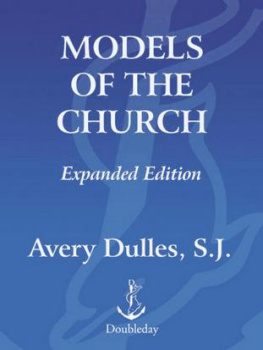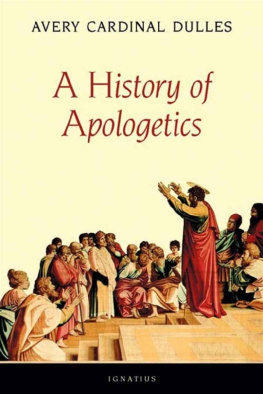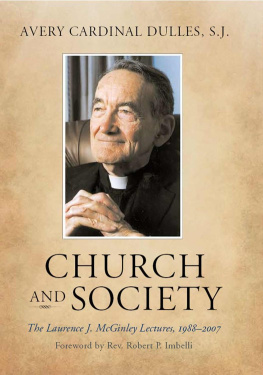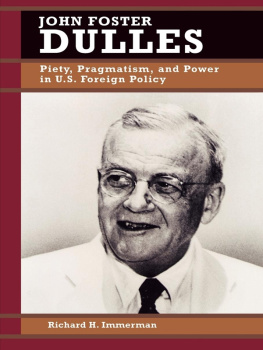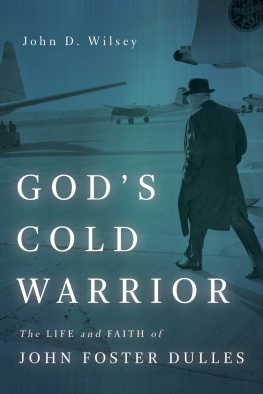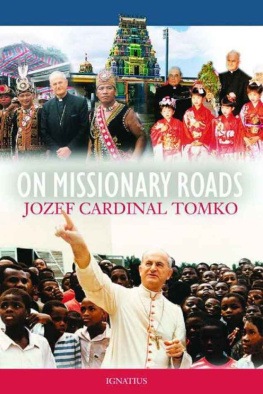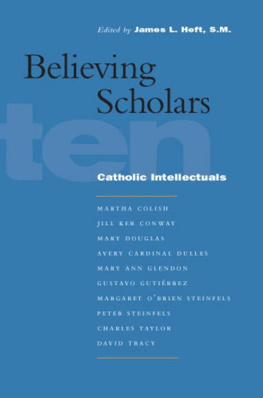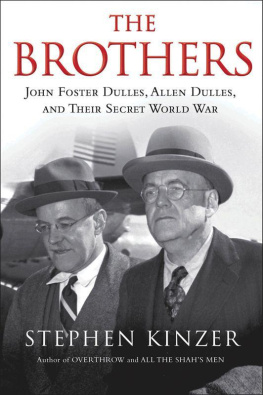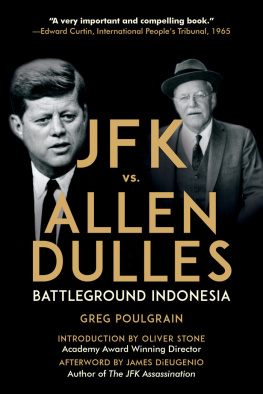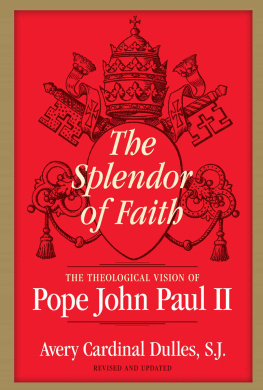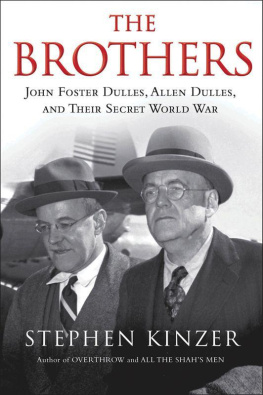The Orthodox Imperative
Selected Essays of Avery Cardinal Dulles , S.J.
Introduction by R. R. Reno
Table of Contents
Introduction
The Essays
The Orthodox Imperative
Tradition and Creativity in Theolog y
The Freedom of Theolog y
The Ways We Worship
Historians and the Reality of Christ
Can Philosophy Be Christian?
Who Can Be Saved?
God and Evolution
The Covenant With Israel
John Paul II and the Truth about Freedom
Catholicism & Capital Punishment
Should the Church Repent?
Religious Freedom: Innovation and Development
The Challenge of the Catechism
True and False Reform
From Ratzinger to Benedict
Introduction
The authority of Fr. Avery Dulles, S.J., in the American Catholic Church was substantial. When Pope John Paul II elevated him to the rank of Cardinal late in life, he put a red hat on a widely acknowledged wise head. To read Dulles is to hear the voice of mainstream contemporary Catholicism: confident without being defensive, convinced without being parochial, and clear-minded about the need for hard thinking about what the Church has always taught and must continue to teach in our postmodern age.
Cardinal Dulles authority rested in large part on his intellectual, moral, and spiritual seriousness. Careful and comprehensive in his scholarship, he was not a man to rush to judgment. He shied away from polemics, regretting very much that the theological debates in the Church have become bitter and often pointless in recent decades. There is no pride of invention in his work, no eager embrace of the latest fashions. As he once said, Readers familiar with my work will be aware that I do not aim at originality, a quality frequently overrated in theology.
His most widely read book, Models of the Church (1974), is the model of evenhanded analysis . The book surveys the many understandings of the Church that came to the fore after the Second Vatican Council. He wished to draw on the best that emerged in the ferment after the Council, yet always with a proper clarity about what is and is not in conformity with the Church s longstanding doctrine.
As aperhaps appropriatetheological creativity turned into a hardened party of dissent in the American church in the1980s, Dulles came to be seen as a conservative figure. But his commitment to intellectual honesty and measured judgmentto say nothing of charityled him to carefully consider theological ideas, even the ones he thought mistaken. He knew that dissent, however politicized, was nearly always motivated by a desire for truth. Dulles had steel in his spine. He was not a man to temporize or compromise. But he never dismissed: He sought to draw out what can be affirmed, even in positions he knew had to be rejected.
His influence also came from his modest matter-of-factness. By his own account, Cardinal Dulles came to faith by way of serious philosophical reflection. But as a writer he has none of the rarified pretensions of an academic savant . His books, essays, and lectures take a direct, unadorned approach. He speaks plainly. And because he speaks of sacred things, the plain speaking is powerful.
Cardinal Dulles was associated with First Things from its very beginnings in the early 1990s. A close friend of Fr. Richard John Neuhaus, the journal s founder, Dulles was a regular in the pages of First Things for nearly two decades. An ongoing seminar sponsored by the magazine on various theological topics was called the Dulles Colloquium. Fr. Neuhaus presided, but on many occasions I saw Dulles slip Neuhaus a note. Fr. Neuhaus would quickly skim the contents. Then, sure enough, within the next five or so minutes, he would make a particularly penetrating observation or ask a decisive question that shifted and reinvigorated the discussion. A wise man keeps wise counsel.
Another occasion impressed upon me the intellectual seriousness with which Dulles approached his work. The colloquium focused on his book on John Henry Newman, another remarkable man who became a Cardinal late in his long and productive life. Colloquium participants sought to characterize Newman as essentially this or essentially that. In each instance Dulles weighed the claimsand then demurred, pointing to a passage in Newman or a feature of his thought that spoke against easy categorization. Newman was influence by Plato, to be sure, but he wasn t a Platonist. He had a developed historical sense, but he wasn t a historicist. There are elements of Hume in Newman, but they were counterbalanced by his firm dogmatic convictions. The man is always more than the sum of his ideas.
It was a remarkable performance, made all the more engaging by the fact that the newly made Cardinal was constantly juggling his eyeglasses, perching one high on his forehead as he adjusted the other pair to see his interlocutors, and then reversing them as he read his notes and consulted the reference books he had brought for the occasion. He was not a man of pretension, academic or otherwise. What mattered was getting things right, as best one can, without flourish. It s a good way to approach theology. It s a good way to approach life.
With this volume of selected essays from the archives of First Things , readers will find ample evidence of the range, clarity, power, and thoroughly Christian intelligence of Cardinal Dulles. He wrote them as he lived his life: to the greater glory of God. He interpreted this great motto of St. Ignatius of Loyola, founder of the Society of Jesus, in the following way: What we have done and are presently doing is never enough.
Read and enjoy, but do not rest. These essays are not enough, never enough. Carry Cardinal Dulles thoughts and ideas forward. Join him as a modest but determined soldier of God, fighting under the banner of the cross. His company is good, and the cause is great.
R. R. Reno
St. Thomas the Apostle , 2012
The Orthodox Imperative
(August / September 2006)
The word orthodox derives from the Greek word orthodoxa , which standard dictionaries translate as right opinion. Aristotle used the verb orthodoxein with the meaning to have a right opinion. The Greek-speak ing Church Fathers continued to use orthdoxos in relation to faith with the meaning having right belief.
During the patristic age, orthodoxy gradually took on a further connotation: conformity with the traditional and universal teaching of the Church. This development rested on the conviction that the Church is, as Paul puts it, the pillar and bulwark of truth (1 Tim. 3:15). From the time of Irenaeus and Tertullian, Catholic Christians were confident that the Church s teaching stood in continuity with that of the apostles, who had received it immediately from Christ and the Holy Spirit. Eusebius in his Ecclesiastical History frequently uses orthodoxy in contrast to heresy . Similarly, Augustine writes in On True Religion : Religion is to be sought... only among those who are called Catholic or orthodox Christians, that is, guardians of truth and followers of right.
The importance of orthodoxy in the first sense is self-evident: Everyone by nature wants to know; the human mind craves truth. Particularly desirable is the truth of revelation, which comes from God and leads to saving union with him. Religious beliefs are right or wrong to the extent that they agree or disagree with the word of God.
The value of orthodoxy in its second senseconformity with Church teachingshould also be clear. As Cardinal Newman observed, we cannot imagine that God would bestow a revelation without making provision for its preservation. The scriptures tell us that he entrusted it to the Church as its custodian and herald. By remaining with the apostolic leadership to the end of time (Matt. 28:20), he protected the Church from succumbing to error. To authenticate her doctrine, the Church needs to have a body of accredited teachers, and the faithful must accept the teaching of their appointed leaders.
Next page

